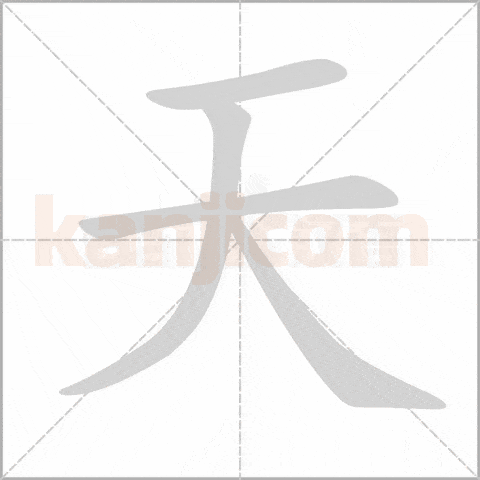
The kanji 天 is composed of a simple yet evocative structure: a horizontal stroke representing the heavens or the sky, with three vertical strokes symbolizing the pillars that hold up the sky. This design conveys a sense of vastness, stability, and the infinite nature of the universe. In its most basic sense, 天 means "sky" or "heaven," but it also carries metaphorical and spiritual connotations.

In Japanese, 天 is often associated with divinity, fate, and the natural world. For example, 天 can refer to the heavens in a religious or philosophical sense, as in 天神 (tenshin), meaning "heavenly god," or 天命 (tengmei), meaning "divine destiny." It is also used in everyday language to describe the sky, as in 蓝天 (ranten), meaning "blue sky," or 天気 (tenki), meaning "weather."
Cultural and Philosophical Significance
The kanji 天 has deep roots in East Asian philosophy and spirituality. In Chinese thought, 天 was originally associated with the concept of "heaven" as a divine force that governed the natural world and human affairs. This idea was later adopted into Japanese culture, where 天 became a central concept in Shinto, Buddhism, and Confucianism.
In Shinto, the indigenous religion of Japan, 天 is closely tied to the kami (spirits or deities) that inhabit the natural world. The heavens are seen as a sacred realm where the gods reside, and 天 often symbolizes the connection between the physical and spiritual realms. For example, the phrase 天照 (tenshou), meaning "heaven's light," is associated with the sun goddess Amaterasu, who is considered the ancestor of the Japanese imperial family.
In Buddhism, 天 is used to describe the celestial realms or heavens, as well as the divine nature of the Buddha and bodhisattvas. The character 天 also appears in Buddhist texts to signify the ultimate truth or the infinite wisdom of the universe.
Moreover, in Confucian philosophy, 天 represents the concept of "heavenly mandate" or "divine order," which emphasizes harmony, balance, and the moral responsibility of humans to align with the natural order.
Modern Relevance and Applications
While the kanji 天 has ancient roots, it continues to play a significant role in modern Japanese culture and language. Its versatility allows it to be used in a wide range of contexts, from literature and art to personal names and branding.
Names and Personal Identity : Many Japanese names incorporate the kanji 天 to evoke a sense of divinity, strength, or grandeur. For example:
天真 (tenshin): Means "innocence" or "purity."
天晴 (tenshou): Means "clear sky" or "bright future."
天音 (tenon): Means "heavenly sound" or "divine voice."
Branding and Marketing : The kanji 天 is often used in brand names to convey a sense of elegance, grandeur, or spiritual depth. For instance:
天然 (tennen): Means "natural" or "authentic," often used in products related to nature or health.
天空 (tenku): Means "sky" or "heavens," commonly used in travel or lifestyle brands.
Literature and Art : In Japanese literature and art, 天 is frequently used to symbolize themes of transcendence, wonder, and the infinite. For example, the novel Heaven by Ryu Murakami explores themes of spirituality and the afterlife, while the kanji 天 appears in many poetic expressions of nature and the cosmos.
Religious and Spiritual Contexts : In modern spirituality, 天 continues to be a powerful symbol of divine connection and inner peace. It is often used in meditation, prayers, and rituals to invoke a sense of harmony with the universe.
The Personal and Collective Meaning of 天
For individuals, the kanji 天 can serve as a source of inspiration and guidance. It reminds us of the vastness of the universe and the infinite possibilities that lie within and around us. Whether in times of doubt or celebration, 天 encourages a sense of wonder and awe, helping us to connect with something greater than ourselves.
On a collective level, 天 reflects the enduring connection between humanity and the natural world. In a modern era marked by rapid technological advancement and environmental challenges, the kanji 天 serves as a reminder to maintain harmony with the earth and the heavens. It calls us to embrace a sense of responsibility for the world we inhabit, just as ancient philosophies once taught.
Conclusion
The kanji 天 is more than just a character; it is a symbol of the infinite, the divine, and the natural world. Its rich history, cultural significance, and modern applications make it a powerful tool for expression and reflection. Whether used in personal names, brand identities, or spiritual practices, 天 continues to inspire and uplift people, bridging the past and present. As we navigate the complexities of life, the kanji 天 reminds us to look to the heavens for guidance, wisdom, and a sense of connection to the universe. In its simplicity, 天 encapsulates the beauty and depth of Japanese culture, offering a timeless message of hope, harmony, and transcendence.